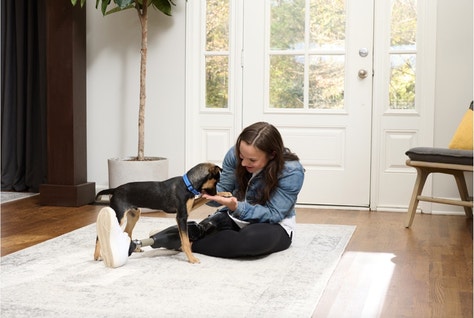
The Mental Health Benefits of Owning a Dog
There are many obvious joys to expect when choosing to share your life with a furry companion: A loyal new friend who's always excited to see you, endless snuggles, and an accountability partner for that daily walk. But did you know that there are several mental health benefits of owning a dog, too?
From reducing stress and anxiety to encouraging healthy lifestyle changes, the positive impact of owning a dog on mental well-being has been scientifically proven. In this article, we will explore how canine companionship enhances mental health and can contribute to a more fulfilling and joyous life.
Owning a dog has many mental health benefits. Their unconditional love and loyal companionship can help reduce stress, combat anxiety, and curb feelings of loneliness or isolation. Let’s take a look at some of the facts and figures:
- Spending time with a dog increases oxytocin levels(open in new tab) the "feel-good" hormone that promotes happiness and relaxation. This could be why 83% of pet owners(open in new tab) say they spend most of their day with their pets.
- Dogs love playing or being petted and it turns out that both can help their owners to lower cortisol (the stress hormone) and decrease anxiety.
- Dogs provide opportunities for exercise and outdoor activities. Walking or jogging with your dog releases endorphins that help to improve your mood(open in new tab) and may act as natural antidepressants. Getting outside in the sun also helps regulate your circadian rhythm and vitamin D levels, which positively influence mental health and well-being.
- Caring for a dog can give you a sense of purpose and help to combat feelings of loneliness or isolation. According to a 2019 US market research study(open in new tab) by The Human Animal Bond Research Institute (HABRI) in collaboration with Mars Petcare, 80% of pet owners said pet interaction can help to reduce feelings of loneliness.Over 55% of the older adults taking part in the survey said that they got a pet to help improve their mental health.
- Spending quality time with a faithful canine companion can boost your self-esteem and confidence.Unconditional love from a dog makes you feel valued and accepted, which often helps build a positive self-image over time through a mutually rewarding bond.
Remember, you should always speak to a medical professional about any prolonged feelings of anxiety, depression or loneliness. For free and confidential support, call 988 or visit their website(open in new tab).

A dog will provide loyal companionship to people of any age because their unconditional love knows no bounds. But owning a dog can also help play an important role in healthy aging for older adults:
Find meaning and joy in life
As you grow older, you might find yourself less engaged in activities that once filled your days. Retirement from your career or having loved ones moving away could contribute to this shift. However taking care of a pet can help bring joy and contribute to an uplifted mood, enhanced optimism, and a sense of self-worth.
Boost vitality
You can overcome many physical challenges associated with aging by taking good care of yourself. Having a dog in your life helps encourage playfulness, laughter, and exercise, all of which can help increase energy levels and boost your immune system.
Stay connected
Sustaining a social circle can become more challenging with age due to factors like retirement, illness, loss, and relocation that can separate you from close friends and family. For older adults who feel like forming new connections is daunting, dogs serve as a fantastic opportunity to spark up conversations and meet new people.
The Mental Health Benefits of Owning a Dog for Children
Owning a dog may offer numerous advantages for children's well-being and development. Dogs can provide constant companionship and can facilitate the development of empathy and close bonds. Interacting with dogs can help foster social skills such as responsibility and nurturing behavior. They may even play a crucial role in developing young minds by teaching empathy and offering a non-judgmental space for children to express themselves.
Along with the emotional benefits, spending time with dogs can help reduce stress(open in new tab) and anxiety(open in new tab). Petting or playing with dogs decreases cortisol levels while boosting mood-enhancing endorphins like serotonin, which acts as a natural antidepressant. Dogs can offer comfort, aiding children in developing coping strategies for handling challenging emotions and social situations.
Beyond emotional support, dogs encourage outdoor play and exercise. Playing with a dog may also serve as a source of calmness and relaxation and can help stimulate a child's imagination and curiosity. It can be a gateway to learning, teaching perseverance through activities like training a dog to perform tricks. The overall experience of caring for a furry friend can add immense joy to a child's life, which can provide both emotional and developmental benefits.
The Science Behind the Human-Dog Bond
The bond between humans and dogs is a unique blend of evolutionary history, biology, and social dynamics. Originating from the domestication of dogs thousands of years ago, this relationship has become unique and enduring. As with all relationships, communication is key (Open in a new tab), with dogs finely attuned to human body language and vocal cues. This shared understanding strengthens emotional connection. Dogs are social beings that provide companionship and emotional support. This is where oxytocin comes in.
The Role of Oxytocin in Human-Dog Interactions
Oxytocin, the "love hormone," plays a vital role in the human-dog bond. When you interact with your dog, oxytocin is released in both you and your canine companion. This hormone is responsible for feelings of affection, attachment, and contentment.
Studies show (Open in a new tab) that oxytocin levels spike in dogs and their owners during playtime, petting, and walks together. The more you engage with your dog, the more oxytocin is produced, strengthening your connection. Spending quality one-on-one time with your pup is essential for both of you to reap the benefits of oxytocin.
Oxytocin also acts as an antidote to cortisol, the stress hormone. Interacting with your dog can help lower anxiety and make you feel more at ease. Their calming presence can decrease blood pressure and heart rate, and help to relax your body and mind.
The oxytocin effect works both ways. Your dog's levels rise when you give them praise, treats, belly rubs, or snuggle together. This helps alleviate separation anxiety in dogs and makes them feel content. Low oxytocin levels are linked to aggression and stress, while higher levels may lead to improved health and longevity for your dog .
This "love hormone" loop between humans and dogs highlights the profound psychological benefits of canine companionship. Our dogs make us feel good, and we make them feel good right back. This mutual affection and bonding fueled by oxytocin is a win-win for both species.
How Owning a Dog can Improve Your Lifestyle
The lifestyle you lead impacts many areas of mental health and well-being. When you adopt a new furry family member, your lifestyle might change. But this can be a very good thing!
Making some healthy lifestyle changes may really help with things like depression, anxiety, stress, bipolar disorder, and PTSD. Here are four ways that owning a dog can help you make healthy lifestyle changes:
Providing companionship
Companionship can help prevent illness.(Open in a new tab) and shows correlational evidence for potentially adding years to your life, while isolation and loneliness may trigger symptoms of depression. Caring for a dog can help by making you feel needed, dependable, and helpful; they give you someone to focus on other than yourself. Dogs can also lend an ear, so that you feel listened to, especially if you live alone. And nothing helps beat loneliness like coming home to a happy pooch with a wagging tail.
Encouraging exercise
Taking a dog for a hike, run, or even your simple daily walk is a fun way to incorporate regular exercise into your routine. Studies have shown(Open in a new tab) that dog owners are more likely to meet their daily exercise requirements—and all those walks are great for your canine too! This time spent together will deepen the connection between you and your dog, it and can help curb most behavior problems in dogs while keeping you both fit and healthy.
Helping you meet new people
When you have a dog, it's common to strike up conversations with fellow dog owners during walks, hikes, or at the dog park. It's a great way to meet new people and make new friends. For example, you might meet fellow dog lovers in pet stores, at the park, on walking trails, or at training classes.
Adding structure and routine to your day
Dogs need a steady routine for feeding and exercise. Maintaining a consistent schedule not only keeps your furry friend balanced and calm but can also have a positive impact on your own well-being. Regardless of your mood—whether you're feeling down, anxious, or stressed—one pleading gaze from your pet will likely motivate you to get up, feed them, give them some exercise, and attend to their needs.
Tips to Help Keep You and Your Canine Happy and Healthy

There are many mental health benefits of owning a dog, but to maximize those benefits and ensure your four-legged friend gets just as much out of your connection as you do, you will need to:
Exercise regularly:
Take your dog for regular walks, jogs, or runs. Exercise provides mental and physical stimulation for you both. Studies show that owners who walk their dogs experience lower stress and better well-being.
Make time for grooming:
Brush, bathe, and pet your dog regularly. Grooming your dog is relaxing and releases oxytocin, the "love hormone," which calms anxiety and helps promote feelings of well-being for you both.
Provide petting and cuddles:
Physical affection lowers cortisol, the stress hormone, while increasing oxytocin and dopamine, the "feel-good" hormone. Petting your dog is a simple way to boost your mood and help ease anxiety, worry, or loneliness.
Play regularly:
Engage your dog in play such as fetch, tug-of-war, puzzles, and hide and seek. Play relieves stress, boosts feel-good hormones, and enhances your connection with your dog.
Spend quality time together:
Spend dedicated one-on-one time with your dog each day, engaging in walks, play, training, grooming, or just relaxing together. Giving your dog your focused time and attention strengthens your bond and provides mental health benefits for you both.
Teach them tricks and cues:
Teach your dog basic cues and fun tricks. Training your dog strengthens the human-animal bond and gives you a sense of purpose. It also challenges your mind, helps improve your dog's behavior, and boosts their confidence.
The Pawfect Companion
There are multiple reasons why getting a dog can do wonders for your mental well-being. The unconditional love of a pet has been shown to decrease feelings of loneliness and isolation, and increase self-esteem.




